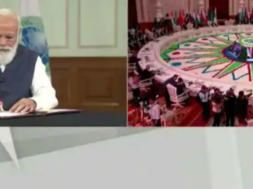
Terror: Modi calls for SCO template to deal with extremism, radicalization
Virendra Pandit
New Delhi: Prime Minister Narendra Modi, who turned 71 on Friday, has called for developing a joint template by the Shanghai Cooperation Organization (SCO) to effectively deal with the mounting challenges of extremism and radicalization.
Virtually addressing the 21st annual SCO Council of Heads of States Summit held at Dushanbe, Tajikistan, he pointed out that the “root cause” of the problems facing the South Asian region is increasing radicalization and the developments in Afghanistan reflected this challenge.
China’s President Xi Jinping said that member-nations of the SCO should help drive a smooth transition in Afghanistan, according to Chinese state-controlled media.
The SCO member-states should guide Afghanistan to develop an inclusive political structure and follow moderate internal and external policies, Xi said.
“I believe that the biggest challenges in this area are related to peace, security, and trust deficit. And the root cause of these problems is the increasing radicalization. The recent developments in Afghanistan have made this challenge more clear,” Modi asserted.
He underlined the need for the nine-member SCO, headquartered in Beijing, China, to jointly develop a template to fight extremism and radicalization.
Modi said the SCO, which includes China and Pakistan, should work to develop a strong network among moderate, tolerant, and inclusive institutions and traditions associated with Islam.
He said the fight against radicalization is not only needed for regional security and trust but also required to ensure a bright future for the youth of the region.
India is committed to increasing its connectivity with Central Asia, he said.
At the same time, Modi also said that any connectivity initiative cannot be a “one-way street” and connectivity projects should be consultative, transparent, and participatory.
Welcoming Iran to the SCO as the ninth member, he said India is helping increase connectivity in Afghanistan via Iran’s Chabahar Port, and such projects should be done by “respecting each nation’s sovereignty”, apparently hinting at the China-Pakistan Economic Corridor (CPEC) which India doesn’t recognize as it passes through Pakistan-occupied Kashmir (PoK).
He said Central Asia has been a bastion of moderate and progressive cultures and values. Sufism flourished there over the centuries and spread throughout the region and the world. “We can still see them in the cultural heritage of this region,” the PM said.
“Based on this historical heritage of Central Asia, the SCO should make a common template of fighting radicalization and extremism. In India, and in almost all the countries of the SCO, there are moderate, tolerant, and inclusive institutions and traditions associated with Islam,” Modi said.
“We believe that landlocked Central Asian countries can benefit immensely by connecting with India’s vast market. Connectivity projects must be consultative, transparent, and participatory to ensure mutual trust. It must respect the territorial integrity of all nations and SCO should form norms for connectivity projects based on these principles.”
Saudi Arabia, Egypt, and Qatar have joined the SCO as dialogue partners, while Iran joined as a full member. Afghanistan is an observer state in the SCO.
The SCO was formed in June 2001 with China, Russia, Kazakhstan, Kyrgyzstan, Tajikistan, and Uzbekistan as members. India and Pakistan became full members in June 2017.
The SCO says its main goals are strengthening mutual trust and neighborliness among the member states.













